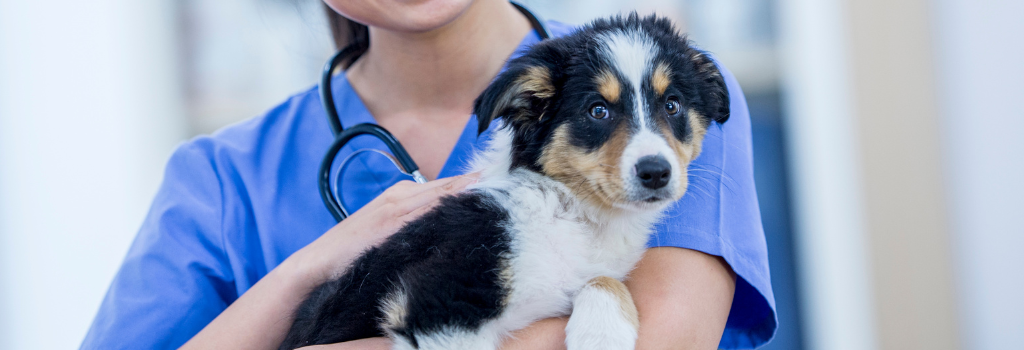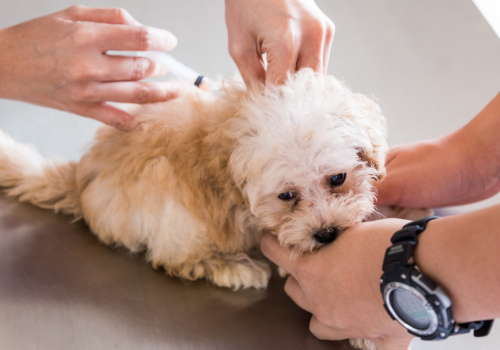Puppy care is such a critical pet care topic, as getting your new pet off to a good start is so important to their health and development. Thankfully, you’ve turned to the internet to do your due diligence as a pet owner, and we’re glad that you found us! At Duxbury Animal Hospital, we work diligently to ensure you get the information you need to keep your puppy (and any other pets) as healthy as possible. Unfortunately, there are many well-meaning pet parents and bloggers out there who share material that isn’t factually accurate. That’s why we’ve taken FAQs on puppy care and answered them thoroughly and accurately so that you can get your puppy on the path to optimal wellness and have them live a long and happy, healthy life.
If you’re seeking a highly trained veterinarian in Duxbury, MA, we’d love to help you care for your puppy and any other pets that you have. If you haven’t had your puppy seen at the vet yet, that’s the first order of business, so please call us right away at (781) 737-7820.
How will proper puppy care impact the life of my dog?
Proper puppy care is the foundation for everything in your dog’s life—not only from the vaccine and medical side in which we prevent various potentially harmful diseases but just as important is the training side. You want to teach them what they can and can't do - and how to do those things properly - from day one. Proper nutrition and securing good veterinary care are also critical to your puppy's health.
Why is it important to start good puppy care on day one?
When a puppy comes to you for the first time, they’ve left their original setting, and every single thing in their life just got turned upside down and is brand new—who you are, how you're going to treat them, how your children may treat them, what is expected, and behavioral issues.. Can they go in this room or on the carpet, or just on the hard floor? Are they inside? Are they outside? Can they sleep in a bed? These are all things they don't initially know, so they have to learn this from day one.
From the medical side, it's essential to start with good puppy care on day one because you want to start with a clean slate. Any issues there—whether it's parasites or vaccination status, heartworm preventatives, etc.—it's imperative to start that at a very early age, so you don't end up trying to fight an uphill battle by dealing with a problem later on down the road.
Puppies also love structure. So from day one, you want to have a good routine, including oral health care, nutrition, training, and exercise.
How soon should I bring my puppy in to see a veterinarian for their first exam?
When you bring your new pet in for an exam depends on when you get the puppy, the puppy’s age, and how many vaccines the puppy has gotten before. So you want to ask the breeder or adoption agency to see when the puppy needs to be seen by the vet because the scheduling for vaccines varies according to their age. In general, the first exam and the first round of vaccines, dewormers, and all the other puppy preventive protocols take place anywhere from six to nine weeks old.
Most breeders provide a 72-hour window or guarantee from the time you pick the puppy up from them. In other words, they give you three days to get the pup checked out by a veterinarian. There are some cases in which that puppy may have an underlying health issue or a congenital birth defect, and you may not want to keep them. We know this sounds rather harsh, but that's what the three-day guarantee is for.
If you’re not quite sure how old the puppy is, we're happy to let you know when the veterinarian should see them.

What are some common health problems in puppies?
GI issues such as vomiting and diarrhea are common in puppies because they are such curious creatures and often get into things they shouldn’t. It’s part of your responsibility as a new puppy parent to learn the signs that your puppy may be ill.
Some other common health issues we see in puppies are:
- Intestinal worms or parasites
- Parvovirus
- Skin issues or infections
- Conjunctivitis
- Upper respiratory infections
- Fontanelles, or soft spots on the head
While they are rare, we also sometimes find congenital heart murmurs and cleft palates in puppies. If the puppy comes in and isn’t yet vaccinated, we want to start them on the protocol right away to prevent them from some potentially harmful and possibly fatal diseases.
What are some signs and symptoms of health issues in puppies?
Depending on what disease process we're talking about, the signs and symptoms can be different. With intestinal worms, you might see diarrhea, lethargy, or vomiting. In the case of parvovirus, you’d likely see vomiting and diarrhea, sometimes with blood in it. We generally diagnose hernias by feeling them.
Inappetence is another significant sign that something isn’t quite right. If the puppy is not showing great appetite, that could be a sign of health issues. Another common thing a sick puppy might experience would be coughing, sneezing, and general malaise. Puppies sleep for a very long time, but if you feel like when they're awake that they're acting very lethargic, that's another sign that you should be concerned about them.

What are the signs of a healthy, thriving puppy?
A healthy, thriving puppy will have good body posture and position with their tail flagging up. They’ll have a healthy appetite, drink well, be able to urinate and defecate, be active but also take long naps, be happy to see you, and be bright and alert. If you call them and they want to sulk in a corner, or they sort of look at you and don't want to do anything, that could indicate something is wrong. Could it be personality? Yes, it could be, but more times than not, a young puppy that is not excitable and able to be roused and playful is usually not 100 percent well.
When should I start training my puppy?
Training should start close to day one! Start with the basics. For example, when you feed the dog, try to encourage them to sit every time as you're putting the food down, and don't reward them or treat them until they stay. It might be for a microsecond that they sit but expect that of them. Make them sit first and then give them the reward. As they get a little bit older, ask them to sit and then put their bowl down. On top of teaching the puppy to sit, also teach them to lay down and that even play biting is not okay. These kinds of basic commands should start right away, but also remember to let them be a puppy. Puppies are like kids—they thrive with structure and expectations. If you let the puppy run wild, then you have to correct them later. And the worst part about that is they won't know why you're correcting them or what they could have done differently.
Most veterinarians will recommend having at least several sessions with professional dog trainers, so you can properly teach your puppy what to do and what not to do. Call us at (781) 737-7820 if you’re looking for a reference for a dog trainer in Duxbury.
What will my vet be looking for when examining my puppy for the first visit?
Puppies obviously can’t talk so it’s critical that we check them thoroughly from nose to tail.
Some of the things veterinarians will check during the first puppy exam are:
- Eyes
- Baby or adult teeth are coming in well
- Heart check - do they have a murmur or arrhythmia?
- Orthopedic check - bones and joints
- Skin and coat check to look for fleas or other parasites or skin infections
- Hernia check
- Stool sample check for worms
- Stomach check - is it distended?
We’ll also ask you plenty of questions about how things are going home—how the puppy is eating, drinking, napping, training, going to the bathroom, activity level, etc.
If you still have questions about puppy care, please don’t hesitate to call us at (781) 737-7820 or email us at info@duxburyanimalhospital.com.